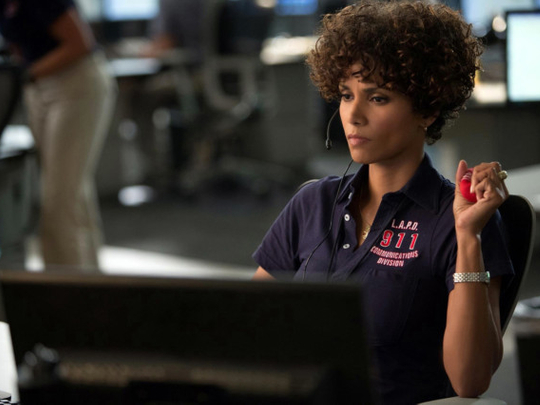
The Call, a tense police procedural starring Halle Berry as a besieged 911 operator, raises more than a few provocative questions: Can’t someone come up with screenwriting software that signals when a script has made the fatal slip from hyped-up suspense to sheer ludicrousness?
Why would a director start a movie he clearly didn’t know how to finish? And why on earth would anyone want to put one of the best haircuts in Hollywood under a bad poodle-cut wig?
This isn’t to say that The Call is devoid of value. Indeed, for a good hour or so, this classic girl-in-jeopardy ticktock obeys all of the fundamentals of the genre, with convincing atmospherics, taut pacing, visceral action and a solid lead performance from Berry (bad hair day notwithstanding).
As a seasoned emergency responder named Jordan, Berry spends most of The Call glued to a chair in a Los Angeles Police Department call centre nicknamed “The Hive”, where a team of dedicated 911 operators handles everything from an errant bat in a bedroom to a double overdose to attempted murders and burglaries-in-progress.
Early in the film, Jordan takes a call from a terrified teenager that does not end well. Rattled, she takes a position training new responders, but she jumps into the breach when another young woman — played by Abigail Breslin — is abducted from a shopping mall car park. Director Brad Anderson (The Machinist, Transsiberian) does a terrific job of establishing Jordan’s work culture (she has embarked on a romance with a colleague, played by the handsome Morris Chestnut) and the war-like combination of bureaucratic ennui and white-knuckled anxiety that defines the psychic space that most 911 operators occupy.
Perhaps unintentionally, The Call even captures the shallow Southern California milieu in which its story takes place; when Breslin’s character sends a tearful last message to her parents, she calls her mum the best in the world because “she always gave me everything I ever wanted”. That touching ode to filial devotion is delivered in the trunk of a swiftly moving car, where a lot of The Call takes place and where it gets a lot more crowded after an unexpected twist. That’s around the same time that the movie — up until now a solid thriller — hints that it seeks to join the ranks of Silence of the Lambs imitators, predicated on graphic sadistic violence and imagining new, ever more gruesome reasons to torture and murder young women (nudity optional).
The twist in The Call is that Berry’s character has no intention of allowing herself or her young charge to be a victim. That ethos of empowerment is commendable, but by The Call’s outlandish and weirdly perfunctory conclusion, it feels less honourable than conveniently self-serving. Audiences may wind up cheering the vigilante manifesto that The Call morphs into, but at some point, they’ll no doubt wish it made slightly better sense.







